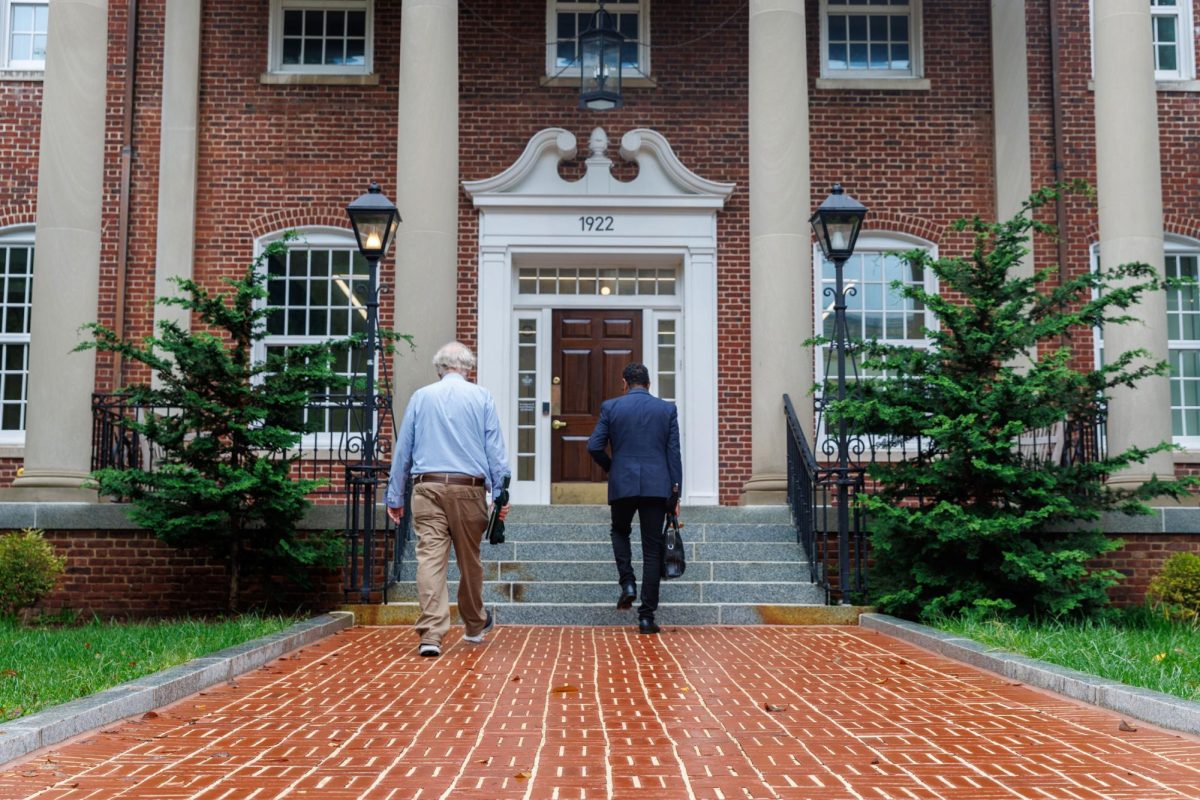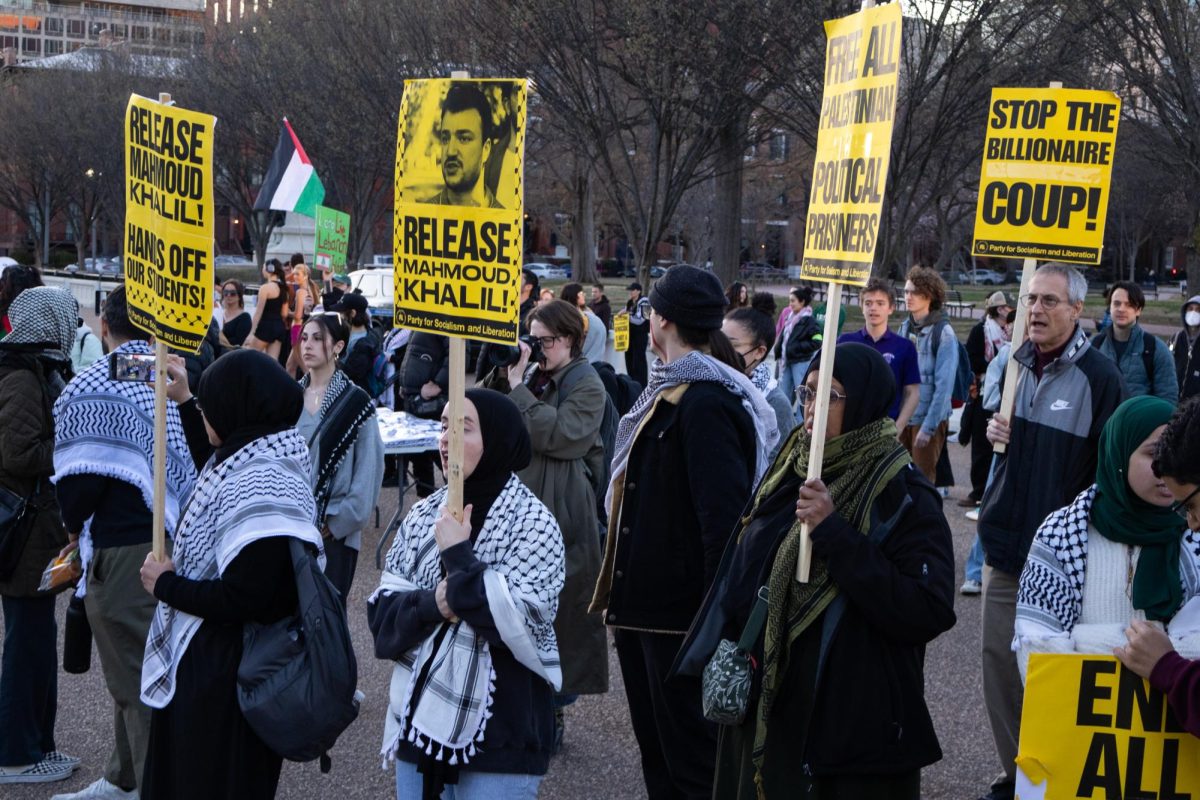A task force investigating whether the University should commit to fully disclosing the source of external funding concluded that the step isn’t necessary, as GW currently employs “appropriate measures” when reviewing potential research and gift sources, according to a Thursday release.
The task force — which Provost Chris Bracey created last June, according to the release — probed GW’s policies and procedures surrounding the acceptance and disclosure of research and gift funding from donors, finding that GW utilizes the necessary steps when assessing potential funding sources and whether they could infringe on the University and researchers’ academic freedom. The task force also found that GW’s gift policy “generally aligns” with its 12 peer schools in terms of safeguarding scholars’ academic freedom but suggested that officials could clarify and strengthen their communication about the considerations that go into decision-making surrounding gift acceptance.
The task force comes after student organizations and faculty have for years called on officials to disclose “restricted gift” donations, when the donors decide where gifts that total more than $50,000 will be used.
Community members have raised concerns that external funding can create biased research outcomes that threatens academic freedom.
A coalition of 15 student organizations and 16 professors, who dubbed themselves the Coalition for Ethics and Transparency, sent a letter to University leadership in January 2023 requesting that officials disclose sources of externally funded research and create annual reports on fundraising from corporations.
“A lack of funding transparency emboldens industry to enforce coercive funding agreements and increases the likelihood that conflicts of interest will be left unnoticed,” the 2023 letter reads.
University spokesperson Shannon McClendon said the task force “fulfilled a commitment” of former interim University President Mark Wrighton but declined to comment on if officials previously publicly shared information with the community about their creation of the task force before they published the findings.
The task force — which was composed of two faculty members and four officials from the Office of the Vice Provost for Research and the Division of University Advancement — found more than 80 percent of GW’s sponsored projects are from funders who publicly display their awards and encourage publication of results, like the federal government, per the report of the task force’s findings.
It also found that individual funders sponsor less than 2 percent of GW’s funding portfolio as a whole, also noting that less than 0.1 percent of gifts received at GW request for donor anonymity.
The report adds that in the “rare case” a donor requests anonymity, it is important to note that even if a sponsor or donor appears anonymous to the public, they are not anonymous to GW leadership, meaning the University is not “blindly accepting” funds without doing “careful due diligence.”
“The Task Force determined that based on this data, the risk by any one outside donor or funder of exertion of influence over GW’s mission is significantly low,” the report reads.
The task force found that in the cases where the University accepts funds that come with conditions, like anonymity or limits on publicity, there are “several” valid reasons for doing so.
Reasons include protecting the academic freedom of individual faculty members, especially if they are studying controversial topics and need protection from threats or harassment, and alleviating donors’ concerns about their reputation and the causes they are donating to.
In light of these findings, the task force said officials should create a website to highlight GW’s “guiding principles” for the acceptance of philanthropic and research funding, which include that a gift won’t be accepted if it does not align with GW’s mission, values and core principles and that accepting a gift does not imply that the University endorses or supports the donor’s beliefs.
It also suggested that GW review who is requesting data about external funding and by what method each request is made to create a streamlined process for individuals requesting the data.
The task force also suggested officials develop trainings, a toolkit and “opportunities for discussion” for the community around the expansion in hostility toward scholars and their findings.
It concluded that officials should “regularly review” and update policies relevant to the “negotiation and acceptance” of outside funding to ensure the policies accurately reflect the University’s guiding principles.
“The Task Force also believes that the suggestions it makes within this report will help to ensure that various stakeholder groups more fully understand how GW makes donor and research funding decisions, and that GW, its researchers and their research will continue to thrive,” the report reads.
Senior Terra Pilch-Bisson — a member of Organizers for Revolutionary Climate Action, which was one of the 14 student organizations involved in the coalition — said that during a meeting with former Interim University President Mark Wrighton with the coalition and Bracey in the spring of 2023, Wrighton committed to creating a task force to investigate GW’s funding transparency.
Pilch-Bisson, a former Hatchet opinions writer, said ORCA didn’t hear anything from officials about the task force until August of last year, when Bracey emailed a former ORCA member saying that officials created a task force, and that faculty and administrators were reviewing GW’s policies and procedures that relate to acceptance, negotiation and disclosure of donations.
She said there was “frustration” among ORCA members because it became clear the task force had become more “explorative” of the University’s code of ethics than an investigation into the donations received.
Pilch-Bisson said members were also “disappointed” that there wasn’t student involvement on the task force because they would bring a perspective of how the research conducted at GW impacts our society, whereas administrators are typically more focused on protecting the University’s finances and faculty are concerned about continuous flows of research funding.
She said ORCA would have appreciated the opportunity to sit on the task force, but the organization would have preferred for any student to be involved, including a graduate student who’s conducting research in a “controversial” era.
“It’s funny because it was a committee on funding transparency, and there was no transparency on who was on the committee or what its purpose was or anything like that for the entire process,” Pilch-Bisson said.





